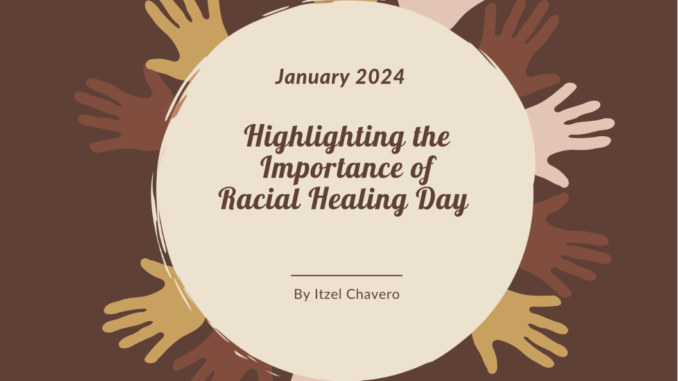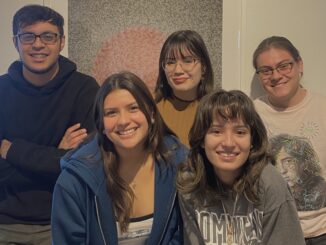
By Itzel Chavero
Dr. Tameka Ellington took National Day of Racial Healing as an opportunity to talk to students about the impact of colonial beauty standards on the African American community.
Amy Omi, assistant director for the office of justice, equity, and inclusion, highlights the importance of acknowledging National Day of Racial Healing by inviting Ellington to speak on different issues.
The event was planned to be held in the Martin Recital Hall but was livestreamed via Zoom due to extreme cold weather.
Dr. Ellington is a speaker, author, and internationally acclaimed fashion scholar.
She obtained a Bachelor of Arts from Kent State University, a Master of Arts in Apparel and Textile Design from Michigan State University, and a Ph.D. in Curriculum and Instruction from Kent State University.
Ellington has written five books including the award-winning book, Textures: The History and Art of Black Hair. In July 2023, she released Black Hair in a White World.
January 16, 2024, marks the 8th annual day of Racial Healing. Taking place every year on the Tuesday after Martin Luther King Day, this day was founded by the W.K. Kellogg Foundation in 2017. It is day to promote healing and understanding among different racial groups.
With the livestream reaching approximately 150 people, Dr. Ellington began the event by reciting a pledge directed towards the audience that served as an agreement to keep an open mind, have empathy and sincerity in her efforts to promote healing.
Today, it is no secret that westernized beauty is the standard when it comes to how people look physically from blonde hair to blue eyes to light skin tone.
This is especially true in the fashion industry. Dr. Ellington uses her work to acknowledge that darker skin colors and textured hair are not often seen on models in the fashion industry.
Black women are forced to change physical aspects of themselves to fit in better and not be called out for their real African beauty because society does not accept it.
“Black people, in many ways, still must go through life wearing a mask, Ellington said. “We just cannot show up as our authentic selves. We have to code switch.”
It is no secret that conversations about cultural appropriation are rising more often. Cultural appropriation is defined when someone of a dominant culture, mostly white, pick up other cultural aspects, which includes how they dress.
In cases when a white person styles their hair with cornrows, it is seen “trendy.” As opposed to when a black person wears them, it is seen as “unprofessional.”
Dr. Ellington spoke about her experience of being the first Black fashion professor at Kent State University, specifically having to deal with “nonracist” people, who are typically known as northern, young, and progressor individuals.
The resistance she endured happened when she was transitioning from being an adjunct to full-time professor.
“Every single time I was denied because of my part-time status, I could see the individuals they would hire instead of me,” she said. “They happened to be white women with less education than me.”
Dr. Ellington stated the importance of learning how white privilege is still present in our times and to begin a process of healing means to recognize what is it and who has it.
She believes it is crucial to understand that white privilege allows people to face no oppression over the color of their skin to build a more equitable society.
To move forward and achieve racial healing, she believes that society must step away from how things have been established in past times to change those societal norms.
“Racial healing is about an entire human race,” Ellington explained. “It is not about how you feel as an individual. It is about how can we move forward the entire human race.”
Omi expresses that the day is important for students as she encourages them to participates in various activities such as engaging in storytelling, open mic discussions, and poetry slams on university campuses.
“Storytelling is so critical to the work or racial justice and healing,” she said. “It offers a way to deal with our stuff. There is somebody to affirm to say, ‘I hear you.’ That causes healing in somebody else too scared to tell their story.”
Omi hopes to continue working with the Center for Cultural Liberation staff on activism as well as create events to benefit minority students at Dominican.


